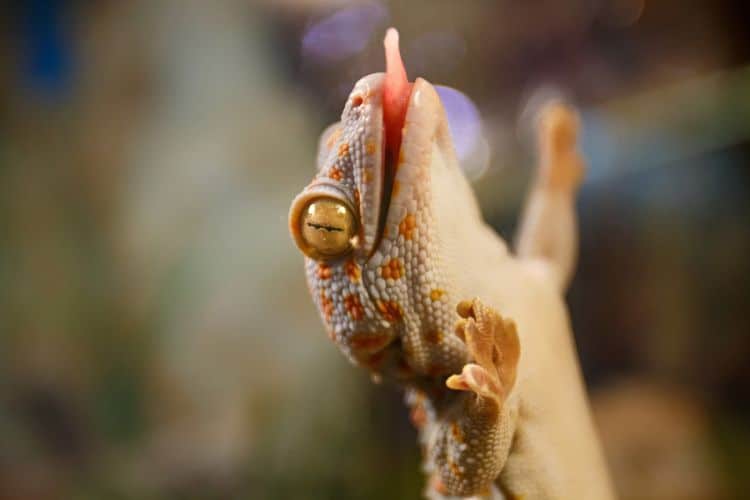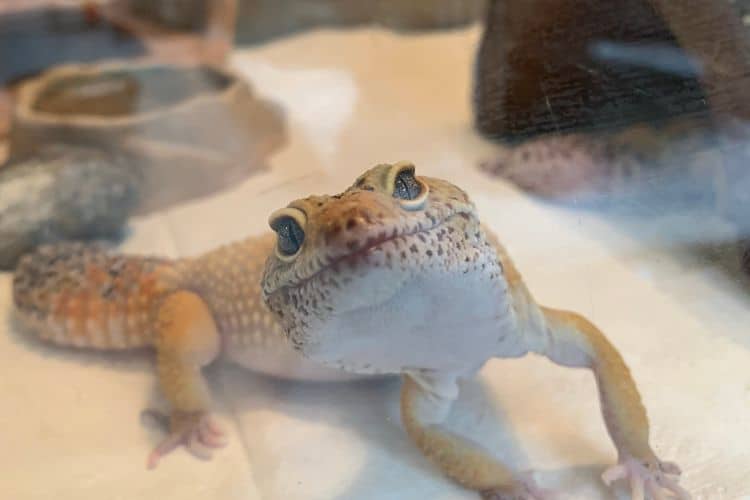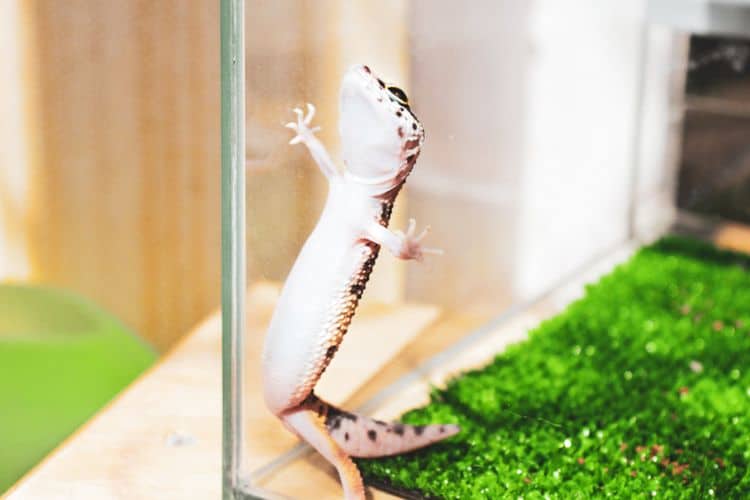Have you ever seen your leopard gecko frantically pacing back and forth against the glass walls of their tank?
This repetitive behavior, known as “glass surfing,” can be unnerving for leopard gecko owners. Why does your gecko seem obsessed with escaping their seemingly perfect home? Should you be concerned?
This article explores the various reasons why your leopard gecko is glass surfing, as well as solutions to address it.

What is Glass Surfing?
Glass surfing, as the name suggests, describes the repetitive behavior of geckos pacing back and forth against the glass walls of their enclosure. This behavior can range from a slow, deliberate walk to a frantic, almost desperate attempt to climb the glass.
While it might seem like your gecko is trying to escape, there’s usually more to it. This behavior could be a sign of stress, discomfort, or a response to changes in their environment.
Glass surfing isn’t an official medical term but rather a phrase people use to describe a behavior seen in leopard geckos and other reptiles.
Understanding the “why” behind this behavior is crucial for addressing the root cause and promoting your gecko’s well-being.
9 Reasons Why Leopard Geckos Pet Surf
There are several reasons why your little buddy might be glass surfing.
1. Cramped Tank
Just like us, geckos need enough space to roam and explore.
If your tank is on the smaller side, your gecko might be feeling confined and searching for more territory.
Consider upgrading to a larger enclosure (at least 20 gallons for adults) with plenty of climbing opportunities.
2. Incorrect Temperature
Geckos are cold-blooded and rely on their environment to regulate their body temperature.
If the warm side of your tank is too cool (ideally 88 to 92°F) or the cool side is too hot (around 77 to 80°F), your gecko might be trying to find a more comfortable spot, leading to glass-surfing.
Ensure proper temperature gradients with thermometers on both sides of the enclosure.

3. Lighting Issues
Leopard geckos are most active at night, but they still need a bit of UVB light to help them make vitamin D3, which is super important for soaking up
Without enough UVB, they can develop metabolic bone disease, which can make them feel uncomfortable and even cause them to start glass-surfing because they’re not feeling their best.
To help prevent this, make sure to give them a low-wattage UVB bulb and put it in the right spot so they can get the most out of it.
4. Too Much Humidity
Although leopard geckos don’t need a super humid rainforest set up, they do need a bit of moisture in the air—around 30 to 40% humidity—to shed their skin properly and stay hydrated.
If it’s too dry, your gecko might start glass-surfing because it’s looking for some moisture to escape the dry conditions.
Keep track of the humidity using a hygrometer and make adjustments as needed. You can add a shallow water dish or lightly mist the tank to keep the humidity within the ideal range.
5. Boredom
Think of your gecko’s tank as their personal adventure playground.
Climbing branches, hides, and other enrichment items are essential for providing a stimulating environment.
Without enough things to explore and climb on, your gecko might become bored and frustrated, leading to glass-dancing.
Spruce up their space with climbing structures, hides, and different textures to keep them engaged.
6. Egg Laying Behavior
If your gecko is female and displaying signs of gravidity, such as a swollen belly or digging behavior, glass-surfing behavior could be entirely normal.
This behavior is commonly observed in female geckos before they lay eggs and is typically nothing to worry about.
7. Parasite Problems
Internal parasites can cause discomfort and restlessness in geckos, leading to glass-surfing as a way to escape the itch or irritation. Regular parasite prevention with vet-recommended medication is crucial.
8. Stress
New tank mates, loud noises, or excessive handling can stress your gecko, leading to glass-surfing as a coping mechanism.
Signs of stress in leopard geckos include decreased appetite, changes in coloration, lethargy, rapid breathing, or frequent hiding.
Minimize stressful situations and ensure a calm and quiet environment for your little buddy.
9. Seeking Escape
In some cases, glass surfing may indicate a desire to escape from the enclosure. This could be due to feeling confined or stressed, or it might be an attempt to find a mate during the breeding season.

What To Do if Gecko Is Glass Surfing
If your gecko is glass surfing, there are several steps you can take to address the behavior:
Check the Environment: Ensure that the gecko’s enclosure meets their needs in terms of temperature, humidity, hiding spots, substrate depth, and overall setup. Make any necessary adjustments to create a comfortable and enriching habitat.
Here’s a general guideline for the ideal temperatures in a leopard gecko’s tank:
| Temperature Zone | Ideal Temperature Range |
| Warm Side (Day) | 88°F – 92°F (31°C – 33°C) |
| Cool Side (Day) | 75°F – 80°F (24°C – 27°C) |
| Nighttime Temperature | 70°F – 75°F (21°C – 24°C) |
Minimize Stress
Look for anything in your gecko’s environment that might bother them, like loud sounds, being handled too often, or other pets bothering them. Make sure their space is quiet and calm so they can feel safe and relaxed.
Provide Enrichment
Offer a variety of hiding spots, climbing structures, and toys to stimulate your gecko’s natural behaviors and prevent boredom. This can include artificial plants, branches, rocks, and tunnels.
Monitor Health
Keep an eye on your gecko’s overall health and behavior.
If you notice any signs of illness or injury, such as lethargy, loss of appetite, or unusual markings on the skin, consult a veterinarian specializing in reptiles for a thorough examination.
Offer Distraction
Keep your gecko entertained by spending quality time with them, gently handling them, or providing live prey like mealworms, wax worms, and darkling beetles for them to hunt.
These activities can shift their attention away from glass surfing and provide mental stimulation, keeping them engaged and content.
Final Thoughts
Glass surfing is when your leopard gecko keeps pacing or rubbing against the sides of its tank, kind of like it’s trying to walk on glass.
Reasons that contribute to this behavior include stress, discomfort, not having enough hiding spots, being bored, feeling hungry, or even getting too much food.
Addressing these factors can help reduce glass surfing and ensure your gecko is happy and healthy.

